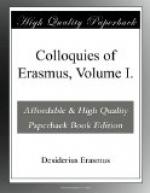But Vows are ridiculed in that passage. Yes, they are ridiculed, and those (of whom there is a vast multitude) are admonished, who, leaving wife and children at home, under a vow made in their cups, run off along with a few pot-companions to Rome, Compostella, or Jerusalem. But, as manners now are, I think it a holier work to dissuade men altogether from such Vows than to urge to the making of them.
These, forsooth, are the execrable heresies which yonder Lynceus descries in the Puerile Colloquy. I wonder why he does not also give my Catunculus and the Publian mimes[D] a dusting. Who does not perceive that these attacks proceed from some private grudge? Yet in nothing have I done him an injury, except that I have favoured good literature, which he hates more than sin; and knows not why. Meantime he boasts that he too has a weapon, by which he may take his revenge. If a man at a feast calls him Choroebus or a drunkard, he in his turn will in the pulpit cry heretic, or forger, or schismatic upon him. I believe, if the cook were to set burnt meat on the dinner-table, he would next day bawl out in the course of his sermon that she was suspected of heresy. Nor is he ashamed, nor does he retreat, though so often caught, by the very facts, in manifest falsehood.
[Footnote D: Publius Syrus (B.C. 45), a writer of mimes, or familiar prose dramas. A collection of apophthegms from his works is said to have been used as a school-book in Jerome’s days.]
In the first place what a foolish, what a mad blather he made against my revised New Testament! Next, what could be more like madness than that remark which he threw out against J. Faber and myself, when the very facts bespoke that he did not understand what agreement there was between me and Faber, or what was the subject of controversy! What more shameless than his fixing a charge of forgery and heresy in the course of a public address on me, because I rendered according to the Greek: Omnes quidem non resurgemus, sed omnes immutabimur ("We shall not all rise again, but we shall all be changed.”) What more like a raging madman, then his warning the people at Mechlin, in a public address, to beware of the heresy of Luther and Erasmus! Why should I now recall the ravings that he belches out rather than utters in the midst of his high feasting as often as his zeal for the house of the Lord is inflamed from his cups? He lately said in Holland, that I was set down for a forger among the divines of Louvain. (One who was present and heard it wrote to me.) When asked, Why? Because, says he, he so often corrects the New Testament! What a dolt of a tongue! Jerome so often corrected the Psalter: is he therefore a forger? In short if he is a forger, who either rashly or from ignorance translates anything otherwise than it should be, he was a forger, whose translation we use at the present day in the Church. But what good does this sort of behavior do him? All men laugh at him as a Morychus,[E] shun him as a crackbrain,—get out of his way as a peevish fellow you can do nothing with. Nor can they think ill of him, of whom he says such spiteful things. And though he displeases all, himself alone he cannot displease.




